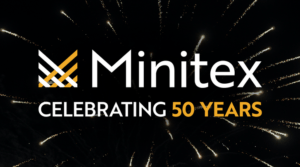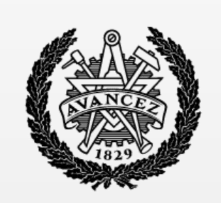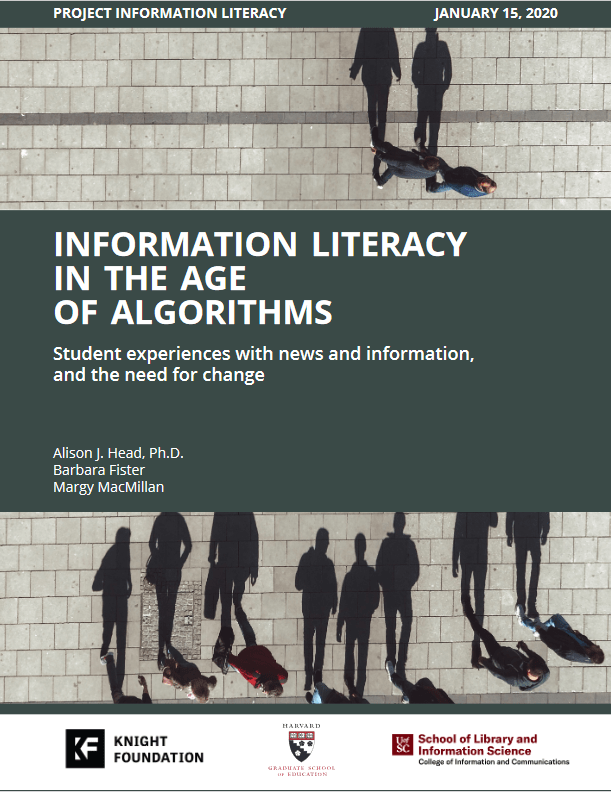 I was invited to speak to librarians at the Lake Superior Library Symposium, a gathering of professionals from all kinds of libraries Up North. Since visiting Duluth is always a good idea, I was happy to be part of the conference program. The theme of the conference was Matter of Fact: Promoting Information Literacy in an Age of Fake News, so I glommed together a lot of thoughts I’ve had about the topic, speaking in particular about the place of libraries in the public sphere, why our values matter, and why it matters that those values haven’t been adopted by Big Tech. (Photo by Garrett Cumber on Unsplash.)
I was invited to speak to librarians at the Lake Superior Library Symposium, a gathering of professionals from all kinds of libraries Up North. Since visiting Duluth is always a good idea, I was happy to be part of the conference program. The theme of the conference was Matter of Fact: Promoting Information Literacy in an Age of Fake News, so I glommed together a lot of thoughts I’ve had about the topic, speaking in particular about the place of libraries in the public sphere, why our values matter, and why it matters that those values haven’t been adopted by Big Tech. (Photo by Garrett Cumber on Unsplash.)
Category: libraries
the answer is … Minitex
 Minitex, our local library cooperative (consortium? collaboration?) is fifty years old, and I got to speak at a virtual party, where there were videos submitted by member libraries, some speakers, and a fun breakout Jeopardy game where I got a couple right but otherwise made a fool of myself. All in a good cause – cheers for fifty years! And cheers for a well-organized Zoom gathering. Here’s the text of what I said.
Minitex, our local library cooperative (consortium? collaboration?) is fifty years old, and I got to speak at a virtual party, where there were videos submitted by member libraries, some speakers, and a fun breakout Jeopardy game where I got a couple right but otherwise made a fool of myself. All in a good cause – cheers for fifty years! And cheers for a well-organized Zoom gathering. Here’s the text of what I said.
Fifty/Fifty: Drawing on the Past to Envision the Future of Minitex
I’m delighted to be part of this wonderful anniversary celebration. Like all of you, I’ve benefitted immeasurably from Minitex, both as a librarian and as a citizen. My relatively small college library couldn’t possibly afford to provide all the information our students and faculty want. Interlibrary loan is the most public-facing Minitex service our community enjoys, but we also benefit behind the scenes from cataloging training and development, cooperative purchasing of things like tattletape, licensing of databases, ELM (now eLibrary), and recently the Minnesota Library Publishing Project, which several of our faculty embraced for publishing local histories or creating class projects, and so on.
Lateral Reading and Information Systems in the Age of Distrust
 This is a talk I prepared for ChALS, a Swedish information literacy conference hosted at Chalmers University. Avancez!
This is a talk I prepared for ChALS, a Swedish information literacy conference hosted at Chalmers University. Avancez!
Thank you for inviting me to be part of this conference, and I appreciate your willingness to listen to an American who has not learned Swedish; my apologies.
I am speaking to you from southern Minnesota, in the north-central United States on land that was taken from the Dakota people of the Očhéthi Šakówiŋ. Following a broken treaty and exile, it was settled by Europeans like my Norwegian grandfather as well as Irish, Germans, Finns, and Swedes. When I grew up I heard stories about pioneers, but not much about what happened to the people whose land was taken. Pioneer stories had a purpose: at best, they taught us the United States was a place many people from different backgrounds could call home. It also was a story about how we took something wild and turned it into farms and cities. Indians were part of a romantic, mythic past, not part of our modern history, or our present society. (Of course, the Indians didn’t disappear. They are still here, like the Sami people.)
Continue reading “Lateral Reading and Information Systems in the Age of Distrust”
Why the Occupy Wall Street Movement Had Libraries
 In honor of the tenth anniversary of Occupy Wall Street, I’m reposting a piece from Library Journal from when I wrote a weekly column that was open access but is now a bunch of 404: Not Founds. Thank you, Internet Archive, for saving it! And congratulations on your 25th anniversary.
In honor of the tenth anniversary of Occupy Wall Street, I’m reposting a piece from Library Journal from when I wrote a weekly column that was open access but is now a bunch of 404: Not Founds. Thank you, Internet Archive, for saving it! And congratulations on your 25th anniversary.
Why the Occupy Wall Street Movement Has Libraries | Peer to Peer Review
Oct 27, 2011
In the first news stories, the fact that Occupy Wall Street had a library seemed a bit whimsical, sort of like that iconic photo of a dancer perched on the back of the equally iconic statue of a charging bull. How funny! A library for a group that has no leaders and no rules? It seemed to some a contradiction in terms. Aren’t libraries all about rules and organization?
Well . . . no. Libraries are fundamentally about something quite different. It seems natural to me that a social movement that springs up locally and without any centralized organizing body or criteria for membership would create a library. This is an impulse so ingrained in the idea of books that people are creating tiny lending libraries to put in public places as signals that sharing books is an important act, something that creates community.
Continue reading “Why the Occupy Wall Street Movement Had Libraries”
reimagining information literacy in the QAnon era
 I’ve thought for years that we need to help students do more than find and use information, we need to help them know where it comes from and what traditions and practices influence it. (I published an article making this argument the year before Mark Zuckerberg scraped the Harvard student directory and made a “hot or not” app that eventually became Facebook, and designed and taught a seminar starting in 2005 that tried to address this notion.) So it’s not a new burr under my saddle, but it has been aggravated by the flourishing of our epistemological crisis. It was honestly kind of exhilarating to draft the first PIL Provocation essay on this theme, using the meta-conspiracy theory QAnon as an example. It fascinates me that “doing the research” and “thinking critically” can lead to … where QAnoners have gone.
I’ve thought for years that we need to help students do more than find and use information, we need to help them know where it comes from and what traditions and practices influence it. (I published an article making this argument the year before Mark Zuckerberg scraped the Harvard student directory and made a “hot or not” app that eventually became Facebook, and designed and taught a seminar starting in 2005 that tried to address this notion.) So it’s not a new burr under my saddle, but it has been aggravated by the flourishing of our epistemological crisis. It was honestly kind of exhilarating to draft the first PIL Provocation essay on this theme, using the meta-conspiracy theory QAnon as an example. It fascinates me that “doing the research” and “thinking critically” can lead to … where QAnoners have gone.
Continue reading “reimagining information literacy in the QAnon era”
new report out from Project Information Literacy!
 It’s always a red-letter day when Project Information Literacy comes out with a report. As a librarian, I always found them thought-provoking, reassuring (oh good, it’s not just our students who do that), and inspiring models of research methods, setting the bar for both qualitative and quantitative research on a scale most librarians can only dream of. These reports have always been great to share with faculty across the campus who play a key role in learning how to navigate information. It really helps to have solid research when you’re advocating for information literacy instruction with scholars who want evidence.
It’s always a red-letter day when Project Information Literacy comes out with a report. As a librarian, I always found them thought-provoking, reassuring (oh good, it’s not just our students who do that), and inspiring models of research methods, setting the bar for both qualitative and quantitative research on a scale most librarians can only dream of. These reports have always been great to share with faculty across the campus who play a key role in learning how to navigate information. It really helps to have solid research when you’re advocating for information literacy instruction with scholars who want evidence.
Continue reading “new report out from Project Information Literacy!”
the bigot in the machine
 The New York Technical Services Librarians, an organization that has been active since 1923 – imagine all that has happened in tech services since 1923! – invited me to give a talk about bias in algorithms. They quickly got a recording up on their site and I am, more slowly, providing the transcript. Thanks for the invite and all the tech support, NYTSL!
The New York Technical Services Librarians, an organization that has been active since 1923 – imagine all that has happened in tech services since 1923! – invited me to give a talk about bias in algorithms. They quickly got a recording up on their site and I am, more slowly, providing the transcript. Thanks for the invite and all the tech support, NYTSL!
The Bigot in the Machine: Bias in Algorithmic Systems
Abstract: We are living in an “age of algorithms.” Vast quantities of information are collected, sorted, shared, combined, and acted on by proprietary black boxes. These systems use machine learning to build models and make predictions from data sets that may be out of date, incomplete, and biased. We will explore the ways bias creeps into information systems, take a look at how “big data,” artificial intelligence and machine learning often amplify bias unwittingly, and consider how these systems can be deliberately exploited by actors for whom bias is a feature, not a bug. Finally, we’ll discuss ways we can work with our communities to create a more fair and just information environment.
libraries and the practice of freedom in the age of algorithms
 I got to give a talk at ER&L about Project Information Literacy‘s latest study. Here’s the text.
I got to give a talk at ER&L about Project Information Literacy‘s latest study. Here’s the text.
Libraries and the Practice of Freedom in the Age of Algorithm
Abstract: How prepared are librarians, and the students they serve, to navigate technologies that are fundamentally changing how we encounter, evaluate, and create information? In the past decade, a handful of platforms have become powerful information intermediaries that help us search and connect but also are tools to foment disinformation, amplify hate, increase polarization, and compile details of our lives as raw material for persuasion and control. We no longer have to seek information; it seeks us. Project Information Literacy has revealed college students’ lived experience through a series of large-scale research studies. To cap a decade of findings, we conducted a qualitative study that asked students, and faculty who teach them, what they know and how they learn about our current information environment. This talk explores what students have taught us, where education falls short, why it matters, and how time-tested library values – privacy, equity, social responsibility, and education for democracy – can provide a blueprint for creating a socio-technical infrastructure that is more just and equitable in the age of algorithms.
Continue reading “libraries and the practice of freedom in the age of algorithms”
dear leader
 There’s a lot going on in the world. Scrolling through my Twitter stream lets me skim across the top of it, dipping in here and there, saving an article, but mostly skimming. It’s oddly comforting, when things seem to be falling apart, to skim the surface.
There’s a lot going on in the world. Scrolling through my Twitter stream lets me skim across the top of it, dipping in here and there, saving an article, but mostly skimming. It’s oddly comforting, when things seem to be falling apart, to skim the surface.
But a tweet from a provocateur I don’t follow keeps coming up as people who I do follow throw up their Twitter hands (wings?) in frustration. A Library Leader thinks we should should embrace the gig economy, stop hiring full time library workers, and let a thousand gig jobs bloom. Because if you have a lot of gig jobs, you can be your own boss and make lots of dough if you hustle enough! Also, you will free yourself from the tyranny of the stable job and its “lack of flexibility.” Wake up, sheeple! It’s what those youngsters want! “The future workforce has less appetite for monotony as their grandparents.”
No kidding! Life is so not boring when you have a pile of school debt, no home you can afford, a looming climate catastrophe, and the thrill of not knowing what tomorrow will hold! A job? Three jobs? A fantastically exciting puzzle of what to do for child care when you have no idea what your schedule will be tomorrow? So flexible! But that absurdity isn’t what made me pause long enough to try and put my thoughts into words. It was the word “monotony.”
balancing acts
 The latest Project Information Literacy report is out, and I hope you’ll have a chance to read it. I was so honored to be able to work on this one and have the opportunity to hear what students have to say about our current information environment. I hope it will contribute in some way to our broadening what we mean by information literacy. These days, as we’re inundated with news and information, we need to prepare students to do more than use libraries for academic purposes. We need to make clearer how the skills students practice in school relate to information use beyond classroom assignments.
The latest Project Information Literacy report is out, and I hope you’ll have a chance to read it. I was so honored to be able to work on this one and have the opportunity to hear what students have to say about our current information environment. I hope it will contribute in some way to our broadening what we mean by information literacy. These days, as we’re inundated with news and information, we need to prepare students to do more than use libraries for academic purposes. We need to make clearer how the skills students practice in school relate to information use beyond classroom assignments.
I was going to say more about the report, but my attention got waylaid when I listened to an excellent episode of the On the Media podcast (they are all excellent, by the way) that reported from the recent gun rights rally in Richmond, Virginia. The rally was planned for MLK day – yes, that’s symbolic. It also happened to be Lobby Day, when Virginians are encouraged to bring their issues to the capital. That day there was only one issue on the agenda, and only one perspective permitted. Second amendment purists brought their body armor, militia insignia, and long guns to say clearly and loudly “our right to bear arms trumps every other right, including your right to disagree with us.”
Nobody was killed. Hurrah. It was considered a success.